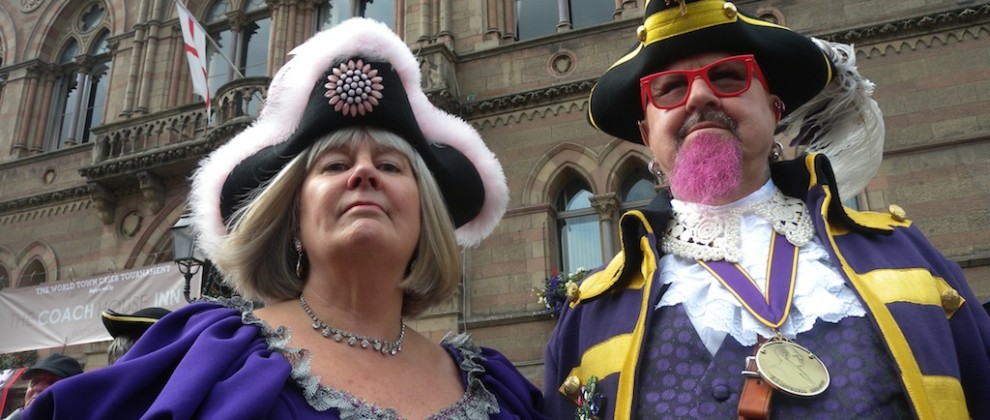Liz Woolnough was hoping for a double celebration.
On the day she was celebrating her 30th birthday, she drove from her home in Lancashire to the historic town of Chester where, bathed in sunlight by the River Dee, she was to compete in the inaugural World Ladies Town Crier Tournament [pictured above].
There, locked in vocal combat, she hoped to strike a blow as the world’s youngest town crier to challenge the old guard of town crying head on — and go home with the gong.
“I like nothing more than dressing up and being a bit theatrical,” says Liz, who fronts a pub covers band and cites Joni Mitchell, Prince and The Darkness amongst influences on her vocal style.
“I’m not a rock-chick town crier, but I have been blessed with big lungs and a deep voice.”
Long tradition
Historically town criers have provided a cornerstone of community life.
William the Conqueror is credited with importing their trademark call of ‘Oyez’ (it means ‘listen up’ in French) but bell-totting criers also appeared in the Bayeux Tapestry and are cited by The Old Testament in The Book of Proverbs.
Far from a dying art, however, town crying is today enjoying something of a renaissance thanks to its tourist appeal. There are currently around 300 town criers across the UK, their numbers swollen by a slew of young recruits such as Liz.
The man championing a more forward-looking groundswell is David Mitchell, secretary of The Loyal Company of Town Criers, Chester’s working crier and organiser of the tournament.
“In the early 20th century town crying was a dying art as many criers never returned from the war,” says Mitchell, an ex-teacher, who swapped classrooms for walking the streets of Chester in £2,000 worth of frilly garb.
“But since I organised the first ever world tournament in mainland UK in 2001, Chester has led the town crying revival.”
Today he and his town-crying wife deliver a daily proclamation at noon from The Cross, the focal point of Chester’s community spirit since the Middle Ages.
But can The Loyal Company really drag town crying into the age of the iPod?
Michael Wood, the town crier of East Riding, Yorkshire and reigning male champion, thinks so. “We’re trying to open things up and move away from the Toby Jug stereotype,” he says.
“Town crying has been stigmatised as the preserve of old men in tights and weekend warriors with too much time on their hands.”
Stage fright
On the day of the competition, Liz draws nervously on a cigarette as time for her debut cry approaches.
Dressed in a tricorn hat, a jabou (cravat) and purple livery (uniform), she takes the stage and delivers her first four-minute, 125-word cry based around the theme of ‘A Woman’s Place’.
The crowd applauds enthusiastically but Liz looks worried, all the more so after a strong performance from July Campbell, the official crier for Murray River Paddle Steamers in Australia.
The second round, a self-scripted cry on the theme ‘Men!’, goes better.
But it’s Caroline Robinson of Palmerston North, New Zealand, who really catches the judges’ eyes with her rhyming couplets and hammed-up style. The judges just aren’t ready, it seems, for a rock n’ roll crier.
Liz may be going home empty-handed but she remains sanguine. “I may not have won but I’ve learnt a lot,” she says.
“Besides,” she laughs, “One of the old boys came up to commiserate me afterwards and said, ‘It’s lovely to see a bit of totty around the place at last’.”
Oyez to that.
What did you think of this story? Post your comments below.
This article was first published in the Weekend FT in 2004.
Liked this? Try also A heritage trail through the curated city.
